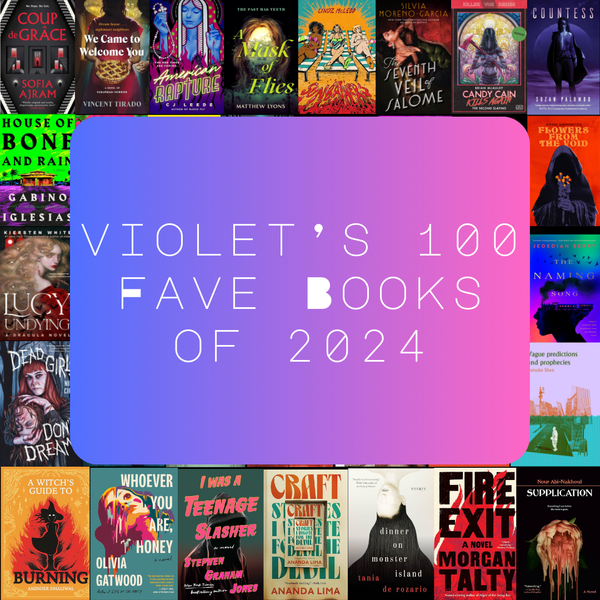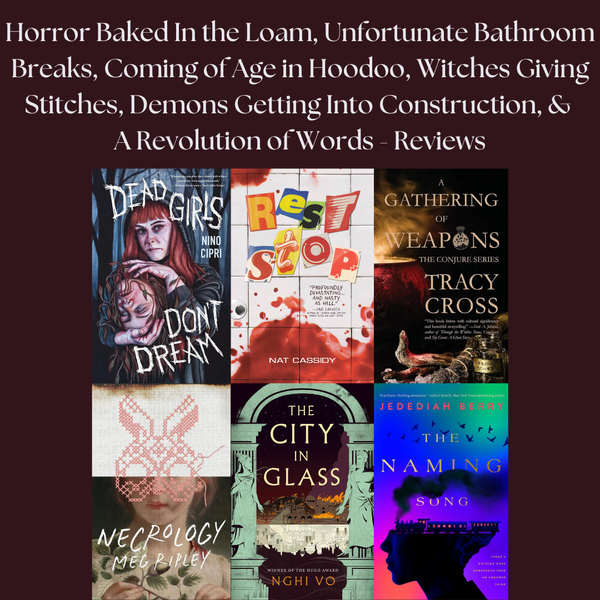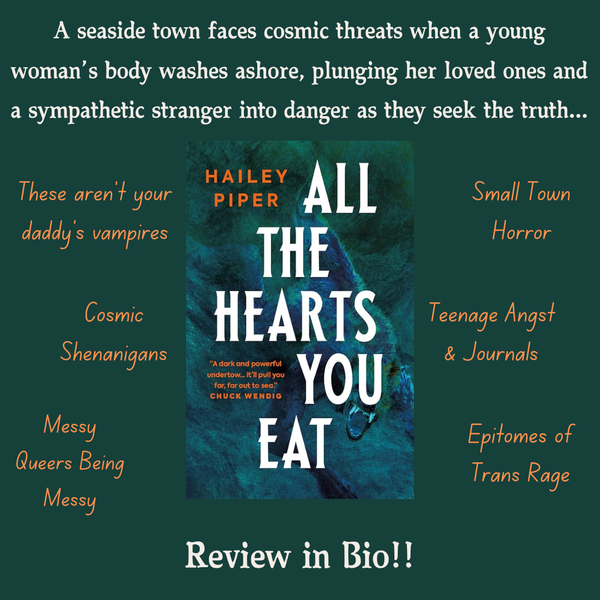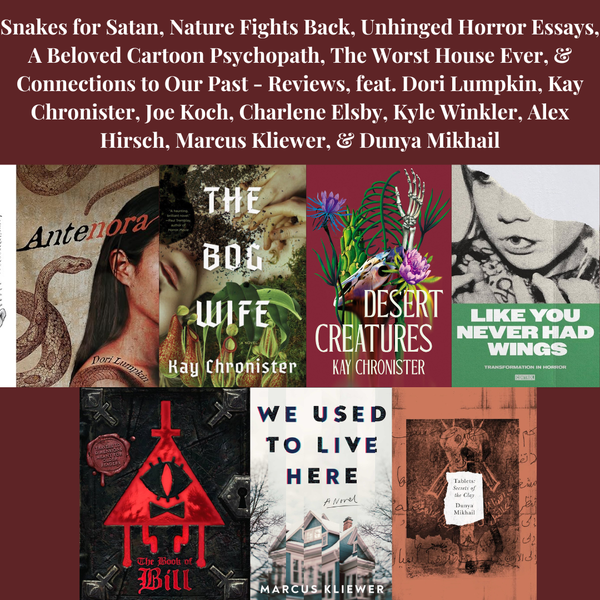Trauma Bites With the Sharpest Teeth - Reviews feat. Kiersten White, CJ Leede, Brian McAuley, Suzan Palumbo, Sam Sax, Elliott Gish, Mason Coile, Alyson Hasson, Lena Valencia, & Lindy Ryan
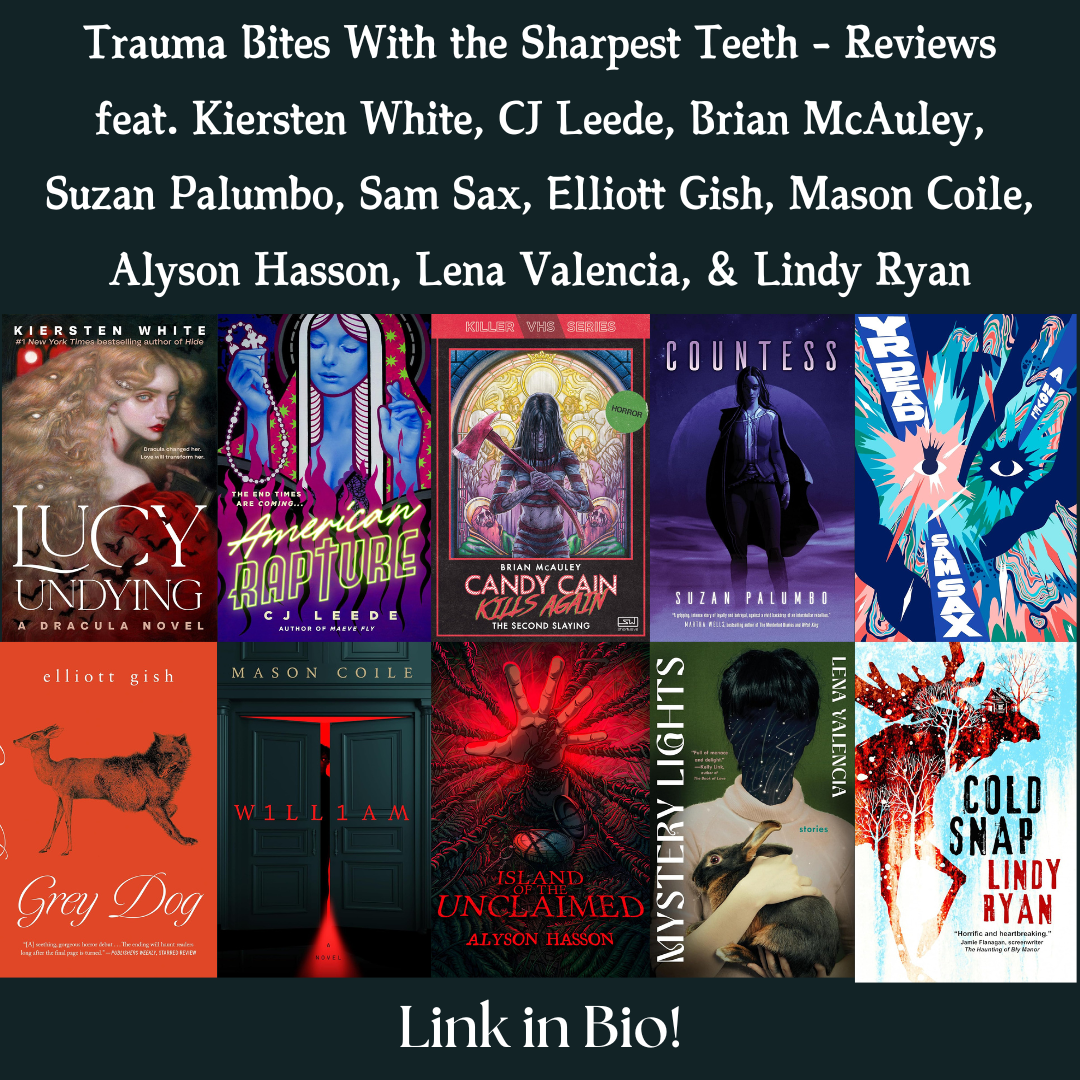
As I glide into the final days of September, I have to say I'm super glad the month is over. It's been an intensely busy month between moving, weddings, activities, and celebrations and little bean is exhausted. A lovely month, just very busy.
Regardless, I am always reading. Today I want to highlight several upcoming and recent reads that continue to set up 2024 as another amazing year for horror and weird fiction. This will likely be a longer one, so be sure to get comfortable and settle in.
Shall we?
Lucy Undying: A Dracula Novel by Kiersten White, Del Ray
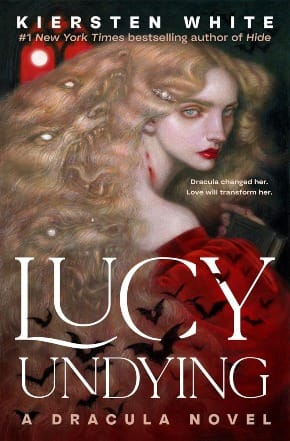
The literary character of Lucy Westenra has undergone a bit of a rebranding in the last several years. With books like Gwendolyn Kiste's Reluctant Immortals, as well as scholarship across academic and YouTube spaces reevaluate one of the most iconic, albeit ignored, characters of Bram Stoker's influential novel. She's one Stoker seemed to not care for himself, having Mina take center stage as she was the most chaste, therefore the most "worth" saving.
Kiersten White has remained a mainstay in horror over the past several years, with 2022's fantastic and widely successful Hide, 2023's emotionally resonant Mister Magic, and her work within middle grade and YA spaces, White's name is one I've certainly come to trust when it comes to any idea she sets to bring to life. Thus enters Lucy Undying, a novel set within Stoker's universe, but drastically widens its scope to account for Westenra's life post-turning, while leading the novel's legacy into contemporary times. Along for the ride is Iris Goldening, a young woman whose childhood trauma has led her to extricate herself from the clutches of her cult-like and abusive family, specifically her mother, who did everything within her power to keep Iris on track to keep their junk-wellness empire thriving, before her death toward the beginning of the story.
Iris and Lucy's lives become inextricably tied when the latter rescues the former in London, just before Iris was about to be pancaked by a bus. After brief flirtations, the two seem to head on their way, where Iris travels to an inherited castle as a means to sell some of the antiquaries inside to raise money for her inevitable escape. Within these early chapters we meet a personable gay driver, Rahul (which I honestly believe is a homage to my beloved Rahul Kohli and his Bly Manor character of Owen, but I can't be sure), who alongside his partner Aaron, become central to Iris's support group during her time eluding her mother's constituents.
As she begins to comb the house for things worth selling, Iris stumbles upon the diary of none other than Lucy Westenra, a young woman whose life and family mirror Iris's in ways that come to comfort our protagonist, causing her to fall in love with the spirit this Lucy seemed to exert throughout her life. In a bid to find further treasures, Iris emails a local art collective to see if someone can come and appraise any of the estates leftovers, only for the person who comes knocking upon her door to be Lucy herself, though she introduces herself as "Elle."
What follows is an epic and sprawling adventure, coupled with some heartwarming queer love, as the two become closer and closer, as do the constituents of Goldening Life–Iris's mother's company–seeking to bring Iris toward her inheritance. I truly did not know what to expect from this novel, being that this year has been fairly vampire-focused. However, I have an absolute soft spot for the story of Lucy Westenra, so following my adoration of the previously mentioned Reluctant Immortals, I was excited to explore another authors reclamation of such a fantastic character–especially if that reclamation is QUEER.
As White mentions in the beginning of her Acknowledgements, Lucy needed a girlfriend. It becomes quickly evident just how in love with Mina she is as we hear her story firsthand through chapters taking place with a therapist, as well as secondhand through her diaries. Lucy's love and faith in Mina becomes a very important aspect to the novel as we see her fall in deeper and deeper love with Iris, seeking the forgiveness within herself as a means of absolving her guilt and shame foisted upon her in her youth. This said, the burgeoning love between Iris and Lucy is fun and fantastic to read, offering some romantasy that isn't solely surface-level. You come to understand and love these characters right alongside them.
There is so much I loved about this book, including: its tone throughout, its humor, the way it balanced its horror, a focus on the importance of found family and healing of one's self, an expert inclusion of a trans character without making a big deal of it, lots of emotion, and so so much more. This is one of those novels that is bound to stand the test of time. Dracula is such a juggernaut of a classic to not only analyze, but reconfigure for a modern audience. We've seen thousands of projects seek to revamp (lol) his legend and influence upon the vampire subgenre. Some have succeeded, while others, not so much, but Lucy Undying is one that not only breathes new life into the legend, but creates an even wider universe for these characters to inhabit, as well as smoothing out more problematic aspects of the original and holding them accountable within this new voice and world.
Kiersten White continues to grow as a writer with each passing book and I would honestly say this is some of her best work yet. I have no idea what she'll set her brilliance to next, but I remain excited for her name to grace my desk yet again. If you want some high-octane queer romance and horror adventure, then enter Halloween season with this energizing read. I highly recommend the audiobook because the voice cast is INCREDIBLE.
American Rapture by CJ Leede, Tor Nightfire
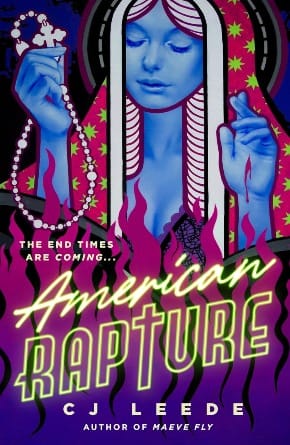
Maeve Fly stole my heart when I read its ARC in the summer of last year. A truly unique queering of American Psycho that went a step further in its subversion, providing a contemporary classic in the making. CJ Leede very quickly became a name I couldn't wait to see more of as we moved into 2024, which is exactly why I was greatly looking forward to American Rapture.
Sometimes I don't look at what books are about when I start them, especially if it's an author I enjoy. This was somewhat the case when I finally came to American Rapture, only knowing slight plot points after talking to Peg about it at work. I'm truly glad I went in fairly blind, because I was in no way prepared for this book, no matter how much or little I prepared.
Much like Lucy A. Snyder's Sister, Maiden, Mother, this novel takes a unique spin on the pandemic as a means of exploring the violence and hate of extreme religion. A strange illness is sweeping through the United States, erasing the sexual inhibitions of humanity and causing folks to turn into animalistic, rage-filled versions of themselves, leading to graphic murders and assaults before the sickness completely kills them. Part zombie apocalypse, part rage virus made famous by 28 Days Later, with a healthy dollop of road novel thrown in, Leede plumbs the depths of human depravity and puritanical belief. At times, it feels like a clever remix on Romero's classic The Crazies.
Throughout the story we follow Sophie, a deeply sheltered Catholic girl whose family keeps her within the confines of their evangelistic faith. Her own connection to that faith is fairly tenuous, as we learn that her twin brother Noah is no longer in the picture, due to his queerness. Sent to what is likely a conversion center, Sophie is only able to communicate with Noah through the phone at the center, and her sojourns out into the real world, though brief, inform her that something very strange is happening to the world around them. When her parents tragically contract the flu that's sweeping the nation, she is attacked by them both during the altercation, causing her to stab her father and narrowly escape in their car.
As she attempts to escape her Wisconsin town, it becomes clear that they've entered a quarantine. After avoiding being attacked by an infected man, she is taken into the care of a young police officer and they travel across states to find safety and a vaccine that will help protect them from the worst aspects of the disease. Along the way they encounter several characters integral to the story including an incredibly loyal dog, the son of Sophie's favorite librarian, another young woman, and a terrified child who quickly comes to view the group as protectors.
Aside from the very real threat of the virus, the disease itself takes a backseat to the darkest villains of the novel: a sect of evangelicals who view the plague as God's will, actively attacking and destroying the vaccine centers and killing thousands in hopes of bringing back the "glory days" of America. Naturally, Catholicism plays a major role within this book. Sophie exhibits her religious trauma throughout their adventures, but she never feels as fanatical or close-minded as the members of her faith that surround her. There are inklings earlier in the story that her community is deeply connected to these religious attacks, but it's greatly evident that this book was a deeply personal one for Leede, who has been vocal with this novel cycle over just how intrinsic religion was to her growing up.
While American Rapture is a horror book, it also defies its influences and is far more subdued than its predecessor. Although, once the violence begins in earnest, you'll certainly find plenty of stomach-churning moments of gore and violence that made Maeve Fly so endlessly charming. This effort also has healthy doses of hope and crippling despair. Do not get attached to any character and I have to give a massive content warning for any pet owners, because there is some gnarly stuff that pops up in this book, but it never feels out of place or overtly cruel. Leede has shown her mastery of juggling the whimsical with the existentially bereft, and there's a form of realism, however bleak, in the ways many of these storylines play out.
I additionally take great joy in how explicitly this book champions and loves libraries and reading. Sophie catches glimpses of the outside world through her love of reading, finding connection with Madeleine L'Engle's cherished classic A Wrinkle in Time. Leede points to the importance of knowledge and the sanctity of public libraries at many points throughout the book, with the religious zealots focus on vaccine centers also serving as commentary on how literature is constantly in danger from political and religious bad actors. As a lifetime reader and lover of/worker at all kinds of libraries, the ways in which Sophie describes her love of reading and the power of books was something I felt so connected to and emotional over. There were also many wonderful Wisconsin easter eggs throughout, including places very personal to me from my stepmother's family, as well as the areas where my father and stepmother married. What can I say, it was an intensely emotional reading experience!
Though quite different from her debut, American Rapture is an absolute triumph from an author who continues to wow audiences. The personal nature of this particular story is an absolute highlight, but it's the depths with which Leede explores humanity that allows for it to stand singularly from her debut. The depravity will feel familiar, but you're introduced to a new and unique voice of hers that only makes me more excited for what comes next. Utterly terrifying, heartbreaking, and endlessly pensive, CJ Leede has done it again.
Candy Cain Kills Again: The Second Slaying by Brian McAuley, Shortwave Press
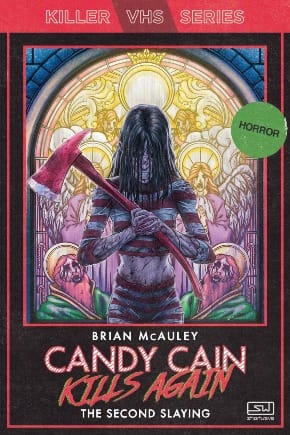
Everyone's favorite holiday-themed slasher is back and madder than ever in the highly anticipated sequel to Brian McAuley's stellar slasher novella, Candy Cain Kills. Continuing Shortwave Press's astounding Killer VHS series, this continuation of the darkest Christmas of all time finds our beloved pajama clad killer very much alive in an opening chapter that rivals the initial sequence of 2021's Halloween Kills. Featuring some of the most brutal and creative kills of the last decade, Abby Thornton dispatches of several firefighters in suitably (hilariously) gruesome fashion.
Also returning are the survivors of the first novella, Nicholas, his sister Fiona, and boyfriend, Matteo, still reeling from the blood-soaked night before, but feel the need to address the church that appears to be at the center of Abby and Candace's pain in the first installment. Similar to American Rapture, religious zealotry is a large theme of the sequel, as footage is eventually revealed to show the central church's pastor had conducted bizarre and disturbing experiments with the two sisters, adding another emotional element of backstory to explain Abby's thirst for revenge. Naturally, said thirst for revenge brings our Candy Cain crashing right into the church steps, putting its parishioners, and the kids, firmly back in the killer's sights. Are they going to survive this time??
God, I really do love this sequel. Without sacrificing its horror, this one does actually have a beautiful ending, bringing everything full-circle in a way that makes absolute sense, even though some may view it as a detraction from the previous tone. To myself, it was the ending I felt McAuley was working toward, as it respects each of its larger characters and their respective endings. The humor, terror, and social commentary remain intact, providing the perfect continuation and expansion of Brian's devious universe.
Countess by Suzan Palumbo, ECW Press
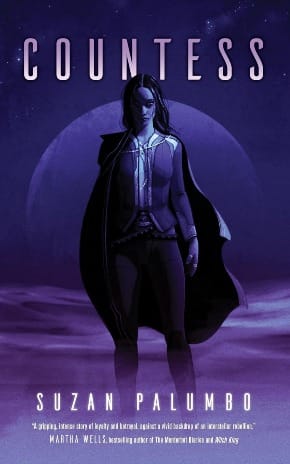
In the year of our Lord, 2024, one of the most exciting speculative fiction writers would release a spectacular re-imagining of The Count of Monte Cristo. Originally by Alexandre Dumas and Auguste Maquet, Suzan Palumbo has subverted a classic by telling an anti-colonial, anti-establishment story about a future where immigration comes at the price of assimilation into a largely settler-colonial "peace keeping" empire.
Virika Sameroo is an officer for the Æerbot Empire, a colonized space within the British West Indies, where she and her family earned their place amongst the powerful and privileged. When her commanding officer is murdered under mysterious circumstances, the system she believed appreciated her immediately turns and throws her in a prison to essentially die as the real murderer continues to flourish and becomes ever-powerful.
After being put through dehumanizing abuse and racism at the hands of her former employers, a sympathetic soldier from the inside aids her in a dangerous escape, filling Virika with a burning hope and sense of revenge, but it isn't until she's able to escape with a ship of revolutionaries that her true purpose begins to take shape, as well as a plan to ignite further revolution within her people and get her ultimate revenge on the empire as a whole.
I'm still desperate to read Palumbo's story collection, Skin Thief, but I can say with certainty that this novella makes me all the more excited to do so. Using science fiction as a vehicle to reconfigure what has always been seen as a classic of revolutionary thought, but using its structure as a means to tell an anti-colonial story of reclaiming power and autonomy is a story we desperately need, especially considering the history of colonialism in the Caribbean throughout history.
Powerful, immense, scathing, and queer as hell, Countess is a fast-paced re-imagining that will stay in your mind and heart for a long long time.
Yr Dead by Sam Sax, McSweeny's
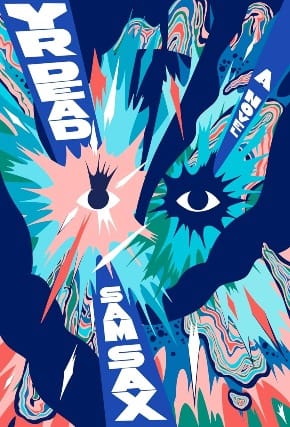
Sam Sax is an incredibly talented queer poet from Chicago whose work is a wealth of queer Jewish experience, which in the last few years has been a wealth amidst zi0ni$m and their fuckery. I imagine much of these engagements with identity were in part what brought Sax to their debut fiction release, Yr Dead.
The story surrounds Ezra, a young person disillusioned with the state of the American empire and its consistent striving for more and more power, while placating its people into a state of compliance. In an act of protest, Ezra self-immolates, and in the moments between the act and his death, the rest of the novel plays out his memories and the moments that lead him to his choice in one of the most creative and breathtaking novels of the year.
There's so little I can say about this book that wouldn't spoil so much of what makes this book remarkable. Similar to other novels written by queer poets, form is a fluid animal in and of itself, functioning as a type of auto-fiction. Chapters sometimes contain only single paragraphs or phrases. It's a truly beautiful way of storytelling and Sam Sax taps in gloriously.
Yr Dead is a smart, empathetic, blistering, funny, and heartbreaking in equal measure. With breathtaking prose and a keen insight, there is nothing quite like Sax's bold vision.
Grey Dog by Elliott Gish, ECW Press
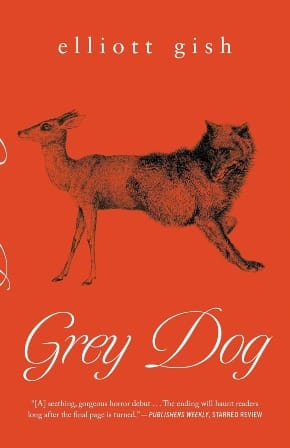
As the release date for Amy Adams's adaptation of Rachel Yoder's wondrous novel Nightbitch looms ever closer, the smaller subgenre of "Good For Her" media seems to be slowing down a tad. I personally feel that some of the nuance of many of these stories get a little obscured by the overarching theme of "good for her," but that is neither here nor there. The main point is these stories do provide a sense of catharsis for women and femmes everywhere. It's similarly encouraging to see the gothic subgenre subvert these themes as well, as is evident in Elliott Gish's gorgeous debut, Grey Dog.
Set in the early 1900's, folk horror blends deceptively with its gothic bedrock as we follow the diary entries of Ada Byrd (the best kind of gothic name) as she accepts a teaching position in the secluded town of Lowry Bridge. Seen as a spinster, as well as holding special interest in naturalism, Ada is subject to the gossip and scrutinization of the more "refined" townspeople. As she settles into her new role, it appears that not all is as peaceful as it would seem. Strange behavior from students, odd noises at night, and burgeoning interest from the towns resident outcast are causing a certain friction in Ada's time in the hamlet.
There's also the fact that she's falling for her closest friend in the town. Being that this takes place in the early 1900's, it's no surprise that lesbianism is something deeply stigmatized by most of society. Not only do readers witness the growth of Ada's feelings through her diaries, but we also slowly come to learn what transgressions have brought her to this particular position. Also considering the time period, it should be no surprise that this book is chock full of misogyny, from other men and women within the town, but also directly from Ada's horrific father, whose behavior only hastens our heroines transformation throughout the story.
Like the best gothics, Grey Dog plays loosely with the supernatural, especially through its proxy of naturalism. This is where I happen to connect the more folk horror aspects, as it becomes obvious that something in the woods is calling to Ada, pressing her to give into her desires and shirk the normality of her current existence. This novel is ultimately about rejecting wider societies list of complexities and contradictions, and much like my earlier mention of Nightbitch, there's the push of embracing a monstrous femininity that people already attempt to foist upon Ada.
For folks who love a delectable slow-burn horror, this is a true gothic in both pacing and mood. Similar to contemporaries such as Donyae Coles and Catherine McCarthy, Gish builds the unease with a practiced hand, leaving little moments of supernatural happenings to keep our hackles raised, but leaving its largest statements and action for its closing moments. And boy, does its ending HIT. You'll have to read to find out what happens because I will not spoil it here, but I will recommend the audiobook, as its narrator, Natalie Naudus, gives a spellbinding and calming performance that helps to ease you into the false sense of comfort that shatters by the ending.
Moody, humorous, gay as hell, and twistedly haunting, Grey Dog is a marvelous start for an author already well-assured in her power over the written word.
William by Mason Coile, G.P. Putnam's Sons
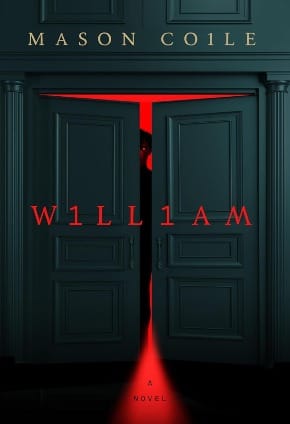
William may potentially be my favorite surprise of the year. I wasn't quite ready for an AI-centric horror novel, which is rich coming from the bitch that wouldn't shut up about M3gan when it came out. I merely wasn't sure if this one would be up my alley or not, but I saw it pop up on the Penguin Random Audio app, and it's only 5 hours long, so why not?? God, I'm so glad I took the shot...
Billed as a psychological horror meets cyber noir, Mason Coile's debut is perfect for folks who enjoy romps such as Child's Play, coupled with the slight sophistication and subversion of M3gan. William tells the story of Henry, a brilliant engineer who suffers from immense agoraphobia. As a means of coping, as well as constructing a way to keep his forthcoming baby safe, he builds a sentient AI he names William. Over time he has taught William many aspects of life outside of their provincial gated community, allowing his creation to teach itself as well.
Also central to this tale is Henry's wife, Lily, who is pregnant and feeling her own acute anxiety as she and Henry have been drifting apart for some time. As a means of connecting Henry to the outside world again in small doses, she invites two of her previous co-workers from her company for dinner, much to Henry's consternation. William senses his creators anxiety, expressing his own concerns as though he feels some form of entity has invaded his programming. Before Henry can address this in any way, the coworkers, one of which is an attractive man that Lily seems quite close to, arrive for their dinner.
It's only a matter of time before Lily's friends want to see William in action. Despite Henry's reservations, he leads them to his laboratory where William exhibits concerning behavior, leading to an ensuing nightmare where whatever appears to be taking over William's programming decides it wants to violently play with the home's current occupants.
From here the book turns into a tech slasher, as the AI goes on to try and hunt down each of the inhabitants as Henry attempts to figure out what is going on. Before it's too late. While this may sound like a fairly straightforward novel, there is a last-minute rug pull that I honestly should have seen coming, but legitimately sent a haymaker spiraling into my gut. I'm serious when I say my jaw hit the floor.
Coile does an excellent job of misdirecting expectation and keeping you theorizing before the pin drop. I was too busy trying to figure out what the hell was going that once he showed his hand, I could barely comprehend its twist, but holy shit it's SUCH A GREAT TWIST.
There is nothing I love more than being surprised by a book. I never for a second doubted Mason Coile's capabilities as a writer, but I just love how much this book grabbed and shocked me within such a burgeoning subgenre as AI horror. Creepy, multi-faceted, and truly heart-wrenching, William is a fantastic entry and template for continued understanding and empathy within the subject of technology and how we interface with it as a species.
Island of the Unclaimed by Alyson Hasson, Hedone Books
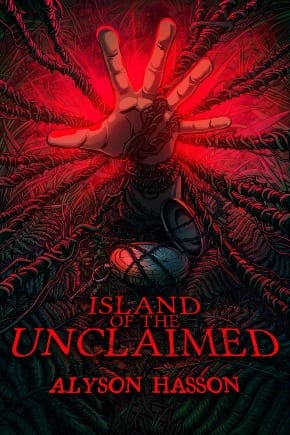
YAAAAAR THE DARK SAILS ARE BACK, ME HARDY'S!!! Yet another exciting pirate-themed romp from the gays at Hedone, this time with a tale of poverty, revenge, and family.
Sybil's brother Walter has been out at sea for a long time, sending back what money he can make so that she and her mother can attempt to hold onto whatever small life they have. When he seems to disappear and her mother tragically passes from her alcoholism, Sybil decides to set out and find her only tether left to this hateful world. What she ultimately finds is much more than she could have bargained for when she joins the band of pirates that abandoned Walter on a cursed island off the port they utilize.
Obviously much darker than The Flesh of the Sea, this novel creates the atmosphere of adventure so intrinsic to the pirate stories of old, while presenting its own themes of social commentary, most importantly the seemingly endless struggle of poverty. Sybil is a fantastic and kick-ass heroine, standing head to head with vicious pirates and the evils of the island.
Speaking of the island, Walter is dealing with his own issues as it becomes evident that there's more to the island, as well as a mysterious figure stalking around. As the siblings converge together on this cursed piece of land, it becomes evident that their misery and struggles are tightly connected to this island as their family legacy has influenced the "evil" of the land, bringing the themes of family full circle, leading them to a final stand against that which has poisoned their family for so long.
Alyson Hasson's debut novella is a great time, combining all of the elements that excite in a pirate and horror tale, providing an excellent heroine in Sybil and an emotional exploration of how our blood connects and defines us, or doesn't. Yet another exciting chapter of the Dark Sails series, which is faaaar from over.
Massive thanks as always to the Hedone team for an ARC!!
Mystery Lights: Stories by Lena Valencia, Tin House Books
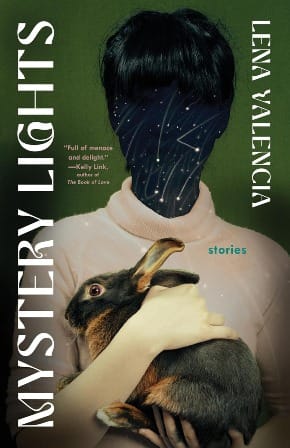
You know I'm a slut for beautiful book covers. Of course Mystery Lights jumped out at me. Plus a blurb from Kelly Link? C'mon.
Lena Valencia's first book of stories, this collection explores different aspects of femininity, displaying how thin the veil between the natural and unnatural truly are, as well as the power/autonomy that can come from embracing the unnatural.
Far more subdued than most story collections I've gushed about on here, it's through its subdued nature that it offers it's most compelling themes. While perhaps not obvious horror, maybe ebbing closer to absurdism and weird fiction, Valencia's stories find women behaving in all manner of ways. Whether acting out of self-interest, guided by malevolent systems, finding themselves in an existence outside of the norm–there are plenty of thought-provoking stories within, and some of them yanked obscenely hard on my heartstrings, while others prompted a knowing chuckle in many of its more meta moments.
One such story, focused on the return of a missing young girl, particularly got me right in the heart in that it presents not only a family trying to move on from catastrophe and grief, but a further grieving of a sibling bond as the older sister grows to learn that her sister is no longer the sibling she loved and cherished. It perfectly captures that form of familial grief, while also providing a form of hope/acceptance intimately familiar to anyone losing friendships and connections following the darkest days of Covid.
Sardonic yet infinitely wise, Mystery Lights may not show its cards as immediately as other speculative story collections, but if you give it a chance and stick with these intricate stories, you will come away with more than you bargained for. Keep your eyes open for this author in the coming years.
Cold Snap by Lindy Ryan, Titan Books
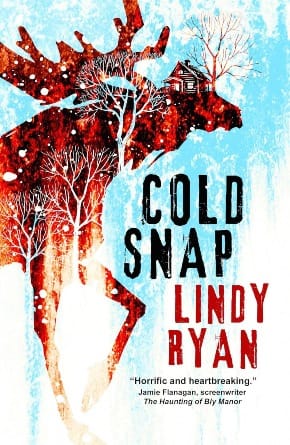
I could characterize this novella as what the film adaptation of The Ritual could be like if Stephen Graham Jones wrote the screenplay, and I'm still not sure if that would adequately cover it.
The second 2024 offering from Lindy Ryan, whose novel from this year, Bless Your Heart, is a fave, Cold Snap is an entirely different animal in that its fractured grief narrative fits more with the surreal and darker works of SGJ and Brian Evenson, further proving her eclectic pedigree.
Following the death of her husband, Christine Sinclaire decides to follow through with his holiday plans of attending a cabin in an extremely secluded area of Pennsylvania. Joined by her teenage son, whose grief manifests as his retreating from his mother as much as possible, and their cat, the group find themselves stalked by a malevolent force appearing as both a looming shadow figure, and some kind of disturbing, immense approximation of a moose in stellar creature description.
The bulk of this novella is focused on Christine's splintering psyche as she begins to hear this creature speak to her in her dead husband's voice, continuously reliving the moment he fell to his death, misremembering, remembering, doubting, and altogether allowing her guilt to consume her. I'm not going to lie, there is a bit of challenge to reading this one, which is sort of the point it's making.
If grief horror has taught us anything over the last few years, there is nothing linear or straightforward about grief or guilt. Some novels have depicted grief in a way that's not quite as surreal, but the atmosphere of Cold Snap relies on its setting and tone to lead its fractured narrative. It's something that definitely won't work for everyone, but it is very much a realized vision. Ryan is not throwing ideas at a wall for the sake of confusion, but utilizing that confusion as a means of earnestly depicting the destabilization of grief.
Culminating in a climax just as whacky as its premise, Ryan makes a bold choice in ending this story as abruptly as a brick wall. This may frustrate many, as we are species that craves culture in our written narratives, but I commend her on sticking to the surreal artifice and offering absolutely zero answers. I can't call this novella satisfying, as it satisfies nothing in terms of traditional storytelling, yet it's within this rejection that Ryan pushes readers to stew in the images, the fractals, and the messy darkness of emotion that it presents.
Cold Snap absolutely warrants re-reading, as there are so many moments and images available to examine and dissect. I can't promise this will help you in any way, but I can promise a unique experience that only Lindy Ryan can provide. With the intensely anticipated sequel to Bless Your Heart on the horizon, perhaps give your attention to this quick slice of madness to tide you over.
And there we have it! If you made it through all ten reviews, thank you so much! These are all excellent titles and I hope you consider even a handful of them.
Endless thanks to the authors and publishers for ARCs and the abilities to experience these titles.
Stay tuned for some more fun goodies as we tentatively step into Halloween season.

